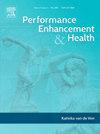对阻力训练的热情与肌肉畸形之间的联系
IF 3.7
Q2 HOSPITALITY, LEISURE, SPORT & TOURISM
引用次数: 0
摘要
目的对阻力训练的过度热情可以预测肌肉畸形等不良后果。同样,社交媒体曝光与肌肉畸形症状增加有关。本研究旨在探讨阻力训练热情(和谐激情和强迫性激情)、社交媒体上的健身内容和肌肉畸形症状之间的关系。方法:我们采用挪威抗阻训练个体的自我报告调查进行了横断面研究。参与者(N = 502)平均年龄为23.72岁(SD = 3.17)完成调查。结果多元线性回归分析显示,强迫性激情和社交媒体健身内容对肌肉畸形症状有正向预测作用,而和谐激情对肌肉畸形症状有负向预测作用。医疗保健专业人员可以利用这些知识来更好地评估和治疗有发展或已经患有肌肉畸形的风险的个体。讨论了对实践和未来建议的其他影响。本文章由计算机程序翻译,如有差异,请以英文原文为准。
The associations between passion for resistance training and muscle dysmorphia
Objective
Obsessive passion for resistance training can predict adverse outcomes such as symptoms of muscle dysmorphia. Similarly, social media exposure has previously been associated with increased muscle dysmorphia symptoms. The present study aimed to investigate the association between passion for resistance training (harmonious and obsessive passion), fitness content on social media, and muscle dysmorphia symptoms.
Method
We conducted a cross-sectional study using a self-report survey administered to resistance training individuals in Norway. Participants (N = 502) with a mean age of 23.72 (SD = 3.17) completed the survey.
Results
Multiple Linear Regression Analyses revealed that obsessive passion and fitness content on social media positively predicted muscle dysmorphia symptoms, whilst harmonious passion negatively predicted symptoms of muscle dysmorphia.
Discussion
Healthcare professionals can use this knowledge to better assess and treat individuals at risk of developing or already suffering from muscle dysmorphia. Additional implications for practice and future recommendations are discussed.
求助全文
通过发布文献求助,成功后即可免费获取论文全文。
去求助
来源期刊

Performance enhancement and health
Social Sciences-Health (social science)
CiteScore
4.70
自引率
0.00%
发文量
27
审稿时长
57 days
 求助内容:
求助内容: 应助结果提醒方式:
应助结果提醒方式:


